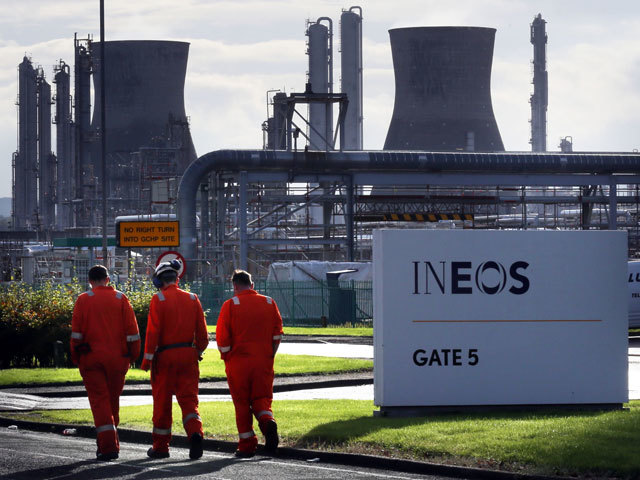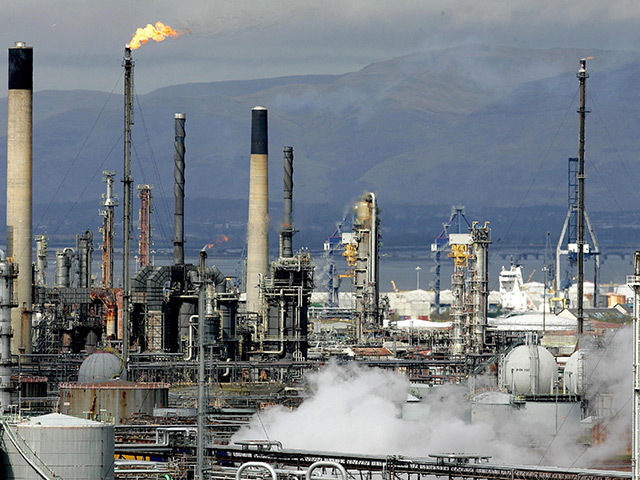
The Scottish Government has given assurances that it is “not against fracking”, according to the boss of a firm which runs Scotland’s largest petrochemical plant.
Jim Ratcliffe, the chief executive and chairman of Ineos, which runs the Grangemouth plant, has suggested an onshore shale gas industry could potentially be set up in Scotland within a few years, despite an indefinite moratorium on granting planning consent for fracking – the method of gas extraction.
The firm has ambitions to establish a large-scale shale gas industry, having acquired fracking exploration licences across 700 square miles of central Scotland.
Ineos proposes using shale gas as a raw material for its chemical plants, and has revealed plans to put millions into exploration.
It has invested in an ethane supply project at Grangemouth that will allow the firm to import, store and use cheap shale gas from the US, with hopes of establishing an indigenous supply in future.
The Scottish Government announced a moratorium on fracking last year amid growing environmental and safety concerns.
It will be in place while a full public consultation is carried out alongside further research into the technique to look at planning, environmental regulation and the impact on public health.
Mr Ratcliffe, told the Herald newspaper: “The Scottish Government are being quite clear. What they’ve said to us is they’re not against fracking. But what they do need to do is get comfortable with whether they’re happy with the risks of fracking in Scotland.
“They want to spend a couple of years understanding it in more detail. I think that’s a responsible thing for them to do and say.
“We don’t need to do any fracking for the next couple of years. What we’d like to do is just drill a couple of holes, do the seismic, and just find out what’s down there.”
Mr Ratcliffe was speaking to the newspaper during a visit to China where the first two of eight ships that will transport shale gas to Grangemouth from the US from next year were officially named following their completion.
He said Ineos will also seek permission to begin test-drilling and seismic testing for fracking imminently, which the firm believes will not breach the moratorium.
The Government’s political opponents have accused it of misleading the public over its position on fracking.
Earlier this year, Labour’s Lewis Macdonald, who has called for more details on the moratorium, said: “I think they’re telling big companies that there’s nothing to worry about at the same time as telling protesters they’re on their side.”
Mr Ratcliffe met with First Minister Nicola Sturgeon on the day the moratorium was announced.
Dr Richard Dixon, director of Friends of the Earth Scotland, called on Ms Sturgeon to clarify what was said at the meeting in light of the Ineos boss’s remarks.
He added: “The Scottish Government is officially neither for nor against fracking, that is after all why we are having a moratorium while the evidence is examined and the public are asked what they think. So, in some respects, Jim Ratcliffe is merely stating the obvious.
“We don’t share Ineos’ rosy view of the world, we’re convinced that Scotland will move to a full ban on fracking when we’ve looked at the evidence of health impacts, environmental contamination and climate change emissions that this industry has brought elsewhere.”
A Scottish Government spokesman said: “This simply reflects what we have already said publicly on this issue – no fracking can or will take place in Scotland while the moratorium we have announced remains in place, a policy that has received wide support from both environmental groups and industry.
“We are taking a careful, considered and evidence-based approach to unconventional oil and gas, and the moratorium and the planned public consultation will allow all stakeholders and local communities to have their say.”
Recommended for you
